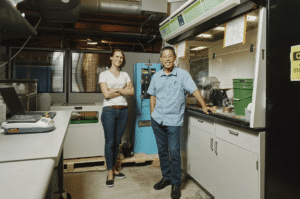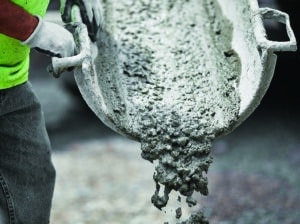
Co-founded by MIT professor Yet-Ming Chiang and electrochemist Leah Ellis, Somerville clean cement startup Sublime Systems plans to build a manufacturing facility at a former mill site along the Connecticut River in Holyoke as the real estate industry tackles the problem of decarbonizing building materials. Photo courtesy of Sublime Systems and Engine Ventures
As MIT-trained scientists pursue clean energy breakthroughs at Cambridge and Somerville incubators, Gateway Cities are seeking to capture a share of Massachusetts’ growing decarbonization economy.
For Somerville-based startup Sublime Systems, the path toward commercialization of its climate-friendly cement product led to an abandoned mill property in Holyoke. At the 16-acre site alongside the Connecticut River, the firm plans to build a plant capable of producing 30,000 tons of low-carbon cement a year. Manufactured at room temperature without the use of high-temperature kilns typically fired with fossil fuels, it could become a standard in the building industry as government regulators consider limiting carbon emissions related to concrete production.
“Founders and teams [of startups] know there’s a lot more to this state than exists between Harvard Square and Logan Airport,” said Ben Downing, vice president of public affairs for Engine Ventures, a Cambridge venture capital fund that is an investor in Sublime Systems. “As they grow and scale, they need space and infrastructure that is only present in communities that have the traditional bones to support manufacturing.”
Incubators such as Somerville’s Greentown Labs and Cambridge’s Engine Accelerator are home to hundreds of startups that could change centuries-old construction techniques.
Spun out of MIT in 2016, The Engine Accelerator specializes in startups in the “tough tech” sector turning academic research into commercial ventures that address issues such as climate change. Nearly 100 early-stage companies occupy its two facilities at 501 Massachusetts Ave. and a former Polaroid lab at 750 Main St. in Cambridge, which serve as proving grounds for research and prototypes.
Tax Credits for Jobs
Like other strategies designed to revive the fortunes of Massachusetts’ economically struggling former manufacturing cities, the Sublime Systems project will rely on public subsidies including a recently approved Economic Development Incentive Program agreement.
The Massachusetts Office of Business Development provided $1 million in tax credits, while Sublime Systems agreed to invest $157 million in the project by the end of 2025 and create 70 full-time jobs in Holyoke.
Holyoke Gas and Electric has indicated it can meet the aggressive timeline to extend utility hookups to the Water Street property, which Sublime Systems has placed under agreement, Downing said.
The site is located a short distance from the Holyoke Dam on the Connecticut River, which provides Holyoke Gas and Electric with approximately two-thirds of the city’s power.
“Sublime was pretty clear on what they prioritized,” said Downing, a Pittsfield native and former state senator who represented western Massachusetts from 2007 to 2016. “The cost of power was going to matter to them, and they wanted that power to be as carbon-free as possible. And they wanted to make the most of opportunities under federal and state incentives. As you start to put together that matrix, you pretty quickly come to Holyoke.”

The MIT scientists behind a new “green” cement factory in Holyoke are betting that demand for low-carbon building materials will create significant growth opportunities in post-industrial Gateway Cities. iStock photo
Potential New Mandates for Clean Concrete
Sublime Systems’ project moves forward at a pivotal moment for clean energy’s transformation of the real estate industry. The federal government is making unprecedented new investments in clean energy under the Inflation Reduction Act, and regulators are considering new requirements on developers to use building materials manufactured with reduced use of fossil fuels.
“Embedded carbon” – a reflection of the amount of fossil fuels needed to produce building materials such as concrete – is a major new focus of regulations affecting development. Cement production accounts for approximately 8 percent of global greenhouse gas emissions, according to climate research.
Boston Mayor Michelle Wu announced this month her administration will propose a net zero zoning code this year, which could limit embedded carbon in new developments.
“We see a significant market for all of these decarbonization technologies driven by commercial real estate policy and the regulatory environment,” Downing said. “It has long-term asset owners thinking about not only how they procure energy and electricity, but also how they address embedded carbon in the materials they purchase.”
The federal Inflation Reduction Act offers a variety of tax breaks and incentives toward decarbonization projects. In its first year, the IRA contributed to 280 clean energy projects totaling $282 billion in investment, according to a recent analysis by Goldman Sachs Asset Management.
Holyoke Searches for Growth Driver
Massachusetts’ third-poorest city with a median per-capita income just under $28,000, Holyoke has struggled to replace jobs lost from the decline of the paper manufacturing industry.
Former Mayor Alex Morse identified cannabis cultivation as a potential source of demand to occupy vacant mills following Massachusetts’ legalization of recreational marijuana sales in 2016, but the industry demand hasn’t matched the real estate activity. There are 20 properties in Holyoke purchased or leased to cannabis companies in recent years that are not in use, according to a 2023 report by MassLive.

Steve Adams
Enter Sublime Systems, co-founded in 2020 by MIT professor and entrepreneur Yet-Ming Chiang and electrochemist Leah Ellis. Their breakthrough research replaces cement’s kiln production – with its intensive fossil fuel demands – with an electrochemical process that takes place at ambient temperatures.
After receiving series A venture capital funding in early 2023, the company sought locations for a manufacturing plant before settling on Holyoke.
Joseph Hicken, Sublime Systems’ head of policy, said the company is hoping to attract state governments and large municipalities as initial customers as it pursues project financing for the Holyoke plant. Approximately half of the concrete in the U.S. is connected to public projects.
“The traditional banking community that invests in project financing is looking for very safe investments with a steady return over many years,” Hicken said. “One of their key considerations is elimination of merchant risk: that if the factory is built, there will be a healthy, robust number of customers on the back end. What I’m excited about is working with the state and large municipalities that use a lot of concrete, and converting that into bankable contracts.”




 |
| 

